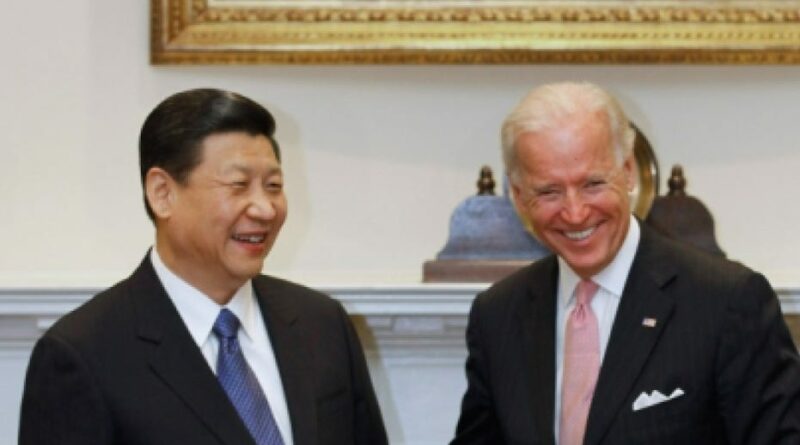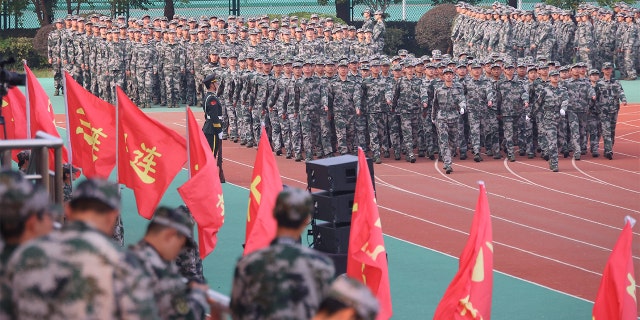Beijing Olympics to renew scrutiny on China's human rights abuses, international violations
The ‘worst’ of Biden’s dealings with China: Peter Schweizer
Author of ‘Red-Handed’ explains the Biden family ties to China, including his claim that they received $31 million, on ‘Jesse Watters Primetime.’
As the Beijing Olympics kick off this month, the games are likely to shine a fresh light on the Chinese communist regime’s human rights abuses at home, as well as its violations of international law and freedoms abroad, with critics warning of the dangers of letting the regime off the hook.
“When this Beijing Olympics happens, they are planning that this will be them showing the world that they are the new superpower of the world, and you mark my words, after this Olympics if everything goes smooth, they’re going to take Taiwan. And when they take Taiwan, it’s over,” former U.N. Ambassador Nikki Haley said recently on “The Glenn Beck Program.”
Haley, who has been sounding the alarm about the growing threat from Beijing for years, was referring to increased Chinese aggression toward Taiwan, an independent territory that China claims sovereignty over. China has been sending warplanes and using increasingly bullish rhetoric, leading to fears that it will invade.
Recently, the Chinese ambassador to the U.S. warned of a “military conflict” with the U.S. if Taiwan forged forward with independence and was backed by the U.S.
As the media and sports worlds rush into Beijing for the Olympics, it remains to be seen to what extent China’s aggression and human rights abuses will form part of the coverage and whether the Olympics will penetrate the iron veil of secrecy Beijing places over its dealings, or if the games will be used as a shield by the regime to deflect that criticism.
Top Republicans in the House have called on the U.S. Olympic and Paralympic Committee (USOPC) to not only keep American athletes safe while competing in the Winter Games but to properly inform them of China’s human rights abuses, warning the games pose “an unprecedented threat to American values.”
Freshmen take part in a military training at Southeast University Oct. 22, 2021, in Nanjing, Jiangsu Province of China.
(Yang Bo/China News Service via Getty Images)
COVID-19 pandemic
One of the most pressing matters for which China has yet to receive any significant international punishment or rebuke is for the outbreak of the COVID-19 virus, which has killed millions and shuttered economies across the globe, while giving a green light for politicians and officials to peel freedoms away from their citizens in the name of prevention.
While there have been multiple investigations and assessments, including by the World Health Organization and the U.S., so far there has been no consensus on whether the virus emerged from a laboratory in Wuhan or if it emerged from a nearby wet market.
China has itself been typically secretive, leading to complaints that Beijing has scuttled investigations and also did not give warning early on to the international community about the virus. Many top health officials in the U.S. and elsewhere have drifted toward the wet market explanation, but since then evidence has emerged that indicates the “lab leak” explanation is credible.
So far, the international community has shown little interest in holding China to account for the pandemic, despite the deaths of millions and the subsequent overhaul of almost every aspect of life.
The persecution of the Uyghurs
Beijing is facing accusations of genocide over its detention of religious minorities, in particular the Uyghur population in the Xinjiang region. It has been accused of forced sterilizations and forced labor in its “re-education camps” among other atrocities.
Beijing denies the claims.
Its treatment of the Uyghurs has sparked broad international condemnation, including from the G-7, and sanctions from the U.S., which has determined that China is committing genocide against the Uyghurs. Estimates have put the number of Uyghurs imprisoned by the regime at more than a million.
“These crimes are ongoing and include: the arbitrary imprisonment or other severe deprivation of physical liberty of more than one million civilians, forced sterilization, torture of a large number of those arbitrarily detained, forced labor, and the imposition of draconian restrictions on freedom of religion or belief, freedom of expression, and freedom of movement,” then-Secretary of State Mike Pompeo said in a Jan. 2021 statement. “The Nuremberg Tribunals at the end of World War II prosecuted perpetrators for crimes against humanity, the same crimes being perpetrated in Xinjiang.”
Information theft and surveillance
China has been raising alarms in the U.S. for years about its international surveillance, spying and information theft. Lawmakers have flagged concerns about its spying on Americans using social media apps, while IP theft is becoming an increasing issue of concern for authorities.
“There’s just no country that presents a broader threat to our ideas, innovation and economic security than China,” FBI Director Christopher Wray said Monday, speaking from the Ronald Reagan Presidential Library. “The Chinese government steals staggering volumes of information and causes deep, job-destroying damage across a wide range of industries.”
That is already having consequences for the Olympics, with the FBI issuing an additional warning this week as U.S. athletes prepare for the 2022 Beijing Winter Olympics, telling the competitors and their teams to stay off social media.
Wray argued that China poses a greater threat to the U.S. than Russia because of its global economic reach and capabilities. While Russian cyberschemes have attempted to thwart American access to services like water, energy and even meat, China has used cybercrime to steal U.S. data for intelligence purposes.
“They’re not just hacking on a huge scale but causing indiscriminate damage to get to what they want,” Wray added.
Fox News’ Caitlin McFall contributed to this report.
Source: Read Full Article





